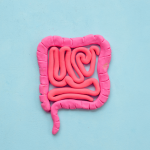
5 Best Foods for Gut Health
August 22, 2025
5 Life-Changing Benefits of Fasting for 24 Hours Once A Week
August 22, 2025Having bad gut health can lead to stomach discomfort, frustrating mood swings, and the persistent feeling of being bloated.
While eating the right foods is important, sometimes our gut needs a little extra support.
That’s where targeted supplementation comes in.
Now, let’s dive into 5 powerful gut health supplements that can make a real difference.
Disclosure: Some of the links below are affiliate links. This means that, at zero cost to you, we will earn an affiliate commission if you click through the link and finalize a purchase.
1. Probiotics
Probiotics are very important for gut health.
They are beneficial living microorganisms, the “good bacteria,” that can populate your gut.
These probiotics help maintain a healthy balance in your microbiome, crowding out harmful pathogens and aiding in digestion.
Different probiotic supplements offer a diverse array of strains.
For instance, a quality supplement often contains a mix of Lactobacillus and Bifidobacterium strains, which are two of the most researched for their digestive benefits.
In one study, a systematic review and meta-analysis of 26 randomized controlled trials, researchers found that probiotics significantly improve intestinal barrier function.
The research showed that probiotics helped create a stronger, less “leaky” gut lining, eased inflammation, and improved the overall balance of gut bacteria by increasing the good kinds.
2. L-Glutamine
This powerful amino acid is highly valued for its profound gut-healing benefits.
It plays a critical role in maintaining the strength and function of your gut barrier, which is essential for preventing unwanted substances from entering your bloodstream, a condition often referred to as “leaky gut.”
L-Glutamine helps to seal and repair the gut lining, reducing gut permeability and supporting overall gut barrier function.
In one study, a randomized controlled clinical trial involving 50 patients with IBS, researchers found that adding glutamine supplementation to a low FODMAP diet was more effective at managing symptoms than the diet alone.
The research showed that the glutamine group experienced a more significant reduction in overall IBS symptom severity, a greater improvement in satisfaction with bowel habits, and a better quality of life.
3. Digestive Enzymes
Digestive enzymes are the perfect supplement for those who experience bloating, gas, and discomfort after meals.
Your body naturally produces enzymes like amylase (for carbs), protease (for protein), and lipase (for fats) to break down food.
However, factors like age, stress, or a poor diet can reduce your natural enzyme production.
Taking a digestive enzyme supplement can help your body efficiently break down food, ensuring better nutrient absorption and reducing symptoms of indigestion.
They can also help reduce food sensitivities by ensuring proper digestion.
In a randomized, placebo-controlled crossover study involving 25 healthy adults, researchers found that a multi-digestive enzyme and herbal supplement effectively reduced post-meal abdominal distension.
The research showed that participants experienced a significant reduction in waist circumference at both 30 and 90 minutes after eating, and a majority of participants also reported less stomach discomfort and gas without any adverse effects.
4. Prebiotic Fiber
Don’t confuse these with probiotics.
Prebiotic fibers are crucial for feeding your beneficial gut bacteria.
Unlike other fibers, prebiotics are not digested by your human cells.
Instead, they travel to your large intestine where they selectively feed your good microbes.
Common prebiotic supplements contain fibers like inulin, FOS (fructooligosaccharides), and GOS (galactooligosaccharides).
When your good bacteria ferment these prebiotics, they produce crucial short-chain fatty acids (SCFAs) like butyrate, acetate, and propionate.
These SCFAs are vital fuel for your gut lining cells, help reduce inflammation, and play roles in metabolism and immune function.
In a systematic review that included 7 randomized controlled studies, researchers found that prebiotics are effective in promoting the abundance of Bifidobacterium and improving gastrointestinal health.
The review showed that prebiotics were beneficial with minimal discomfort, but noted that the type and amount of prebiotic are important factors to consider.
5. Omega-3 Fatty Acids
These aren’t just for heart and brain health, they are important for your gut too!
Omega-3 fatty acids, specifically EPA and DHA found in fish oil and algae oil, are powerful anti-inflammatory compounds.
Chronic inflammation is a major disruptor of gut balance and contributes to conditions like IBD and IBS.
Omega-3s help to modulate the inflammatory response in the gut, creating a more hospitable environment for beneficial bacteria to thrive.
They can also support the integrity of the intestinal lining and may influence the diversity of the gut microbiome.
In a randomized controlled trial involving 22 healthy volunteers, researchers investigated the effect of omega-3 supplements on the human gut microbiota.
The study found that omega-3 supplementation led to a reversible increase in the abundance of several beneficial bacteria.
These included bacteria such as Bifidobacterium, Roseburia, and Lactobacillus.
